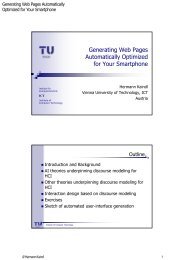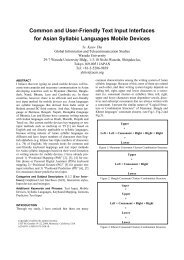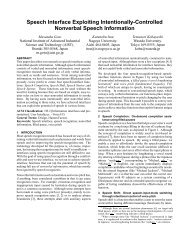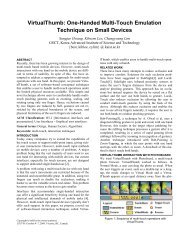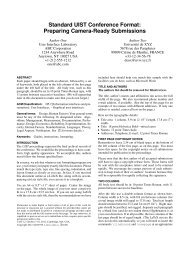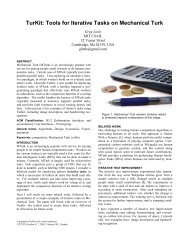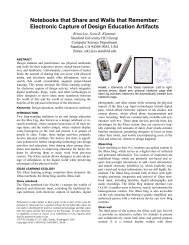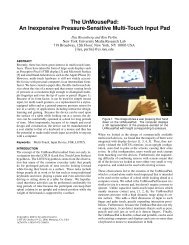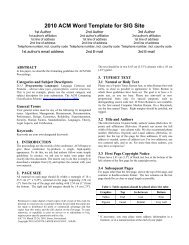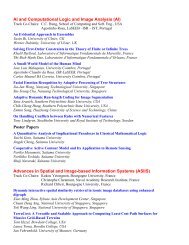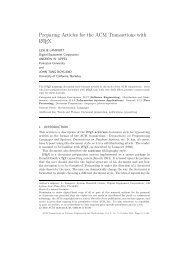API Design Matters Stonebraker and Seltzer - RabbitMQ
API Design Matters Stonebraker and Seltzer - RabbitMQ
API Design Matters Stonebraker and Seltzer - RabbitMQ
You also want an ePaper? Increase the reach of your titles
YUMPU automatically turns print PDFs into web optimized ePapers that Google loves.
Many system break-ins relating to Linux <strong>and</strong> Unix<br />
Web servers happen via insecure CGIs.<br />
Implement rings of security in CGIs.<br />
Try to design your application so that even if it finds a<br />
CGI vulnerability, the system is protected from major<br />
damage. One solution is to have CGIs just be front<br />
ends for a solidly written server running on a different<br />
machine. The more hurdles a hacker must jump to reach<br />
the goal, the more likely it is that he or she will stumble.<br />
Watch for bug reports in third-party CGIs <strong>and</strong> inspect<br />
their code.<br />
If you use third party-supplied CGI scripts (such as<br />
shopping carts), you should subscribe to the appropriate<br />
mailing lists <strong>and</strong> watch for security bulletins. If possible,<br />
get the source code <strong>and</strong> review it. If you do not know the<br />
language, then get someone who does to review it.<br />
Many CGIs, both commercial <strong>and</strong> open source, have<br />
severe security holes that are well known to the hacker<br />
community. Many locally written CGIs have security<br />
vulnerabilities because the programmers who write them<br />
typically have no training in writing secure code <strong>and</strong> such<br />
code is rarely audited.<br />
Avoid creating <strong>and</strong> using set-UID <strong>and</strong> set-GID programs<br />
to the maximum extent possible, especially programs set-<br />
UID to root (<strong>and</strong> try real hard).<br />
Many system programs run as root. Frequently all these<br />
programs need to be set-UID to run as some user to gain<br />
access to data that should not be world accessible. Other<br />
programs need to be set-UID to root only when starting<br />
to open a low network port for listening or to change its<br />
privileges to that of a particular user. In this case, the pro-<br />
gram then should give up root privileges. Apache, named,<br />
<strong>and</strong> ftpd were enhanced several years ago to do this for<br />
better security. Different programs may need to be set-<br />
UID to different users to protect them from each other.<br />
Do not keep clients’ confidential data on the Web server.<br />
Avoid storing users’ privileged data (credit card numbers,<br />
financial details, mailing addresses <strong>and</strong> phone numbers,<br />
etc.) on the same machine as the Web server. This separa-<br />
tion will force a hacker to crack two systems instead of<br />
just one to get this data.<br />
Do not include users’ confidential data (credit card<br />
numbers, financial details, mailing addresses <strong>and</strong> phone<br />
numbers, session ID, etc.) in an URL or cookie. 6<br />
Frequently this is done (insecurely) as arguments to a CGI<br />
more queue: www.acmqueue.com<br />
program. Consider the following example:<br />
www.abroker.com/cgi-bin/address_change?account=666<br />
?passwd=secret&addr=1+Maple+St.&phone=301-688-6524<br />
Some browsers may store this URL (containing confi-<br />
dential data) in a history file. If someone is browsing from<br />
a public terminal, such as a school or library, you could<br />
be liable for careless h<strong>and</strong>ling of the data. Similar issues<br />
are present for cookies.<br />
Be very sure that the privileged data that a user supplies<br />
on a form does not show up as the default data for the<br />
next person to “pull down” that form <strong>and</strong> see.<br />
Yes, this has actually happened.<br />
Always protect the user who types in a password.<br />
Take the user to a secured area prior to this information<br />
being entered <strong>and</strong> ensure that the password or credit card<br />
number will be encrypted on the system (with https)<br />
before transmission to your server.<br />
SIN fIvE: INSUffICIENT RESOURCES ANd<br />
MISPlACEd PRIORITIES<br />
At many organizations, management simply will not<br />
approve sufficient resources to allow sysadmins to provide<br />
good security. It takes many things to achieve a truly<br />
comprehensive security solution. Education, design,<br />
proper implementation, user training, maintenance, <strong>and</strong><br />
continual vigilance all are required for an organization<br />
to be secure. Frequently, security is limited to what a sys-<br />
admin is willing to do on his or her own time. Yet, a sys-<br />
admin who is unwilling to spend the time will certainly<br />
be blamed for any violations. This deadly sin concerns<br />
problems that are not the sysadmin’s direct responsibility.<br />
In other words, management will not allow the sysadmin<br />
to make the changes necessary for good security.<br />
This may not be a “technical” problem, but it has been<br />
the cause of break-ins at numerous organizations. Lack<br />
of resources commonly is a result of misplaced priorities.<br />
For example, the following is a common misconception<br />
of those whose organizations have not been broken into:<br />
“The media exaggerates every danger well beyond the<br />
true risk.” Show your manager media accounts of large<br />
companies that have suffered security breaches. If you<br />
shopped at T.J. Maxx or Marshalls in 2006, you probably<br />
received a new credit card number thanks to TJX Cos.,<br />
the parent company, which suffered a security breach<br />
in December. Circuit City suffered a similar breach.<br />
Consider making a present of Bruce Schneier’s excellent<br />
ACM QUEUE May-June 2007 45



